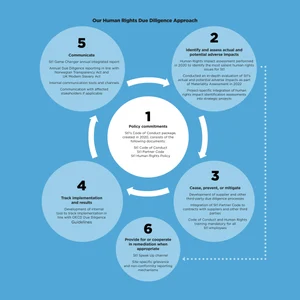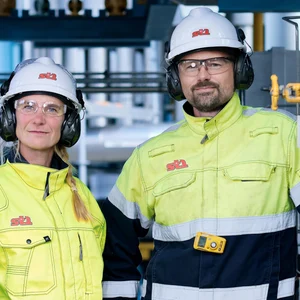Human rights
Our human rights due diligence approach
Recognising that many human rights challenges are complex and systemic, St1 works to promote human rights through long-term commitments and cooperation with local and global stakeholders. We also recognise the need to provide special attention and protection for vulnerable or marginalised groups, and we expect our partners to uphold these same principles and take proactive steps to prevent human rights violations.

Key policies to reflect our commitment to respect human rights
The commitment to respect human rights is reflected in several cornerstone policies, including the St1 Human Rights Policy, which outlines our commitment to respect fundamental human rights; St1 Code of Conduct that established the ground rules for St1 employees; St1 Partner Code, which sets ethical standards for partners operating within our supply chain; and HSSE Policy (not public), to guide our employees on HSSE specific matters.
Together, these policies and Codes of Conduct provide a framework for upholding worker rights and ensuring ethical conduct throughout the value chain.
St1 Code of Conduct
St1 Human Rights Policy
St1 Partner Code
St1’s human rights policy
St1’s human rights policy states that all individuals shall be treated equally and prohibits child labour, forced or compulsory labour, and human trafficking in St1’s operations and value chain.
Core principles in St1’s human rights policy
Fair wages and working hours
Freedom of association and collective bargaining
Equal and fair treatment without fear of discrimination
Health and safety
Forced labour and modern slavery
Child labour
Positive societal impact on communities
Anti-corruption
Right to privacy

Protecting people – tackling the most salient human rights risks
Fundamental labour rights, health and safety, non-discrimination and equal opportunities, as well as land and resource rights, have been identified as salient human rights issues for St1, following an impact assessment conducted in 2022. These areas are considered to carry the highest risk of causing severe negative impacts. The potential risks and impacts will be re-evaluated in 2025, with a detailed plan to mitigate, follow-up, remediate, and communicate on these risks in 2025.
The most salient human rights risks
Human rights in project development
St1 is committed to ensuring human rights due diligence is conducted for our investment projects. Stakeholder engagement serves as a crucial aspect of our project development. We are working towards ensuring that requirements from Corporate Sustainability Due Diligence Directive (CSDDD) and appropriate due diligence are met. The active engagement and dialogue with stakeholders help us identify potential human rights impacts at the initial stages of any project, allowing us to work together with stakeholders to avoid, minimise, mitigate, or compensate for these impacts. Our aim is to foster positive development in the societies in which we operate and contribute to a socially just energy transition.
Our investment management process is designed to be transparent and structured, facilitating the management of projects that support the energy transition through significant investments in new renewable energy projects. In 2024, as part of the operating model project work, we incorporated building sustainability due diligence requirements into St1 projects. In 2025, we will continue to integrate human rights due diligence into our investment management process to ensure that human rights and other sustainability risks are identified at the early on. As part of this work, our aim is to continue the development of sustainability assessments and criteria for different investment gates, in more detail, with a focus on select projects such as BioÖstrand.
Integrating human rights into business practices
Through training and policy commitments, the human rights practices will become more embedded and guide every St1 employee’s way of working. As part of our ongoing commitment to human rights, mandatory basic human rights training is required for all employees in alignment with the St1 Code of Conduct. More specific training programmes are conducted for retail staff and contractors, equipping them with the knowledge needed to maintain safe and sustainable practices. Additionally, we plan to strengthen value chain worker engagement and training within our upstream supply chain in the near future.
We are in the process of further integrating the identified human rights issues into key policy documents and guidelines and developing governance mechanisms to manage them. These efforts aim to ensure that crucial measures to prevent negative impacts and maximise positive ones are applied consistently throughout our business operations. Through these actions, St1 seeks to ensure ethical business practices, protect workers’ rights, and reinforce accountability across our operations.
Risks related to our suppliers, customers or counterparties are managed through our partner due diligence process.
In compliance with the Norwegian Transparency Act (Åpenhetsloven) and the UK Modern Slavery Act, we publish an annual due diligence statement to communicate our efforts in managing human rights risks.

